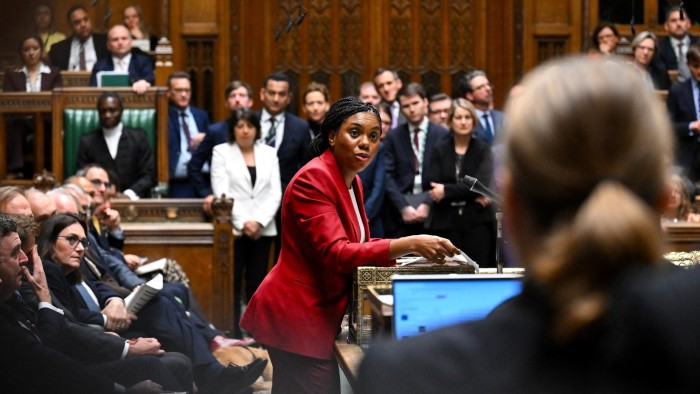This article is an on-site version of our Inside Politics newsletter. Subscribers can sign up here to get the newsletter delivered every weekday. If you’re not a subscriber, you can still receive the newsletter free for 30 days
Good morning. As the year reaches its close, we are at the point when almost everyone in Westminster feels too tired and too lazy to write about serious matters. That’s one big reason why the major talking points this week are Nigel Farage’s hopes in an election five years from now, and Kemi Badenoch’s feelings about sandwiches. Some thoughts in today’s note on the latter, and why it isn’t quite as trivial as it seems.
Inside Politics is edited by Georgina Quach. Read the previous edition of the newsletter here. Please send gossip, thoughts and feedback to insidepolitics@ft.com
Ms Saffron Walden’s feelings for sandwiches
Kemi Badenoch has given a wide-ranging interview with the Spectator, but the major talking point from it is her antipathy to sandwiches.
“I’m not a sandwich person, I don’t think sandwiches are a real food. It’s what you have for breakfast. I will not touch bread if it is moist.”
Keir Starmer’s spokesperson has responded by talking about the prime minister’s love for “the great British sandwich”, while Nigel Farage has recorded a short video talking up his enjoyment of lunch and sandwiches, both of which Badenoch criticised in her interview. At the time of writing, Ed Davey has yet to comment, which seems like a pretty persuasive argument for voting Liberal Democrat if you ask me.
There’s a serious point here. If I were to ask, say, my grandmother — a white South African who came to the UK aged 21, heavily pregnant, because she knew that her mixed-race child (my mother) would not be able to enjoy the opportunities and freedoms she wanted for her in apartheid era South Africa — about British sandwiches, she too would use words like “moist” and would probably say it wasn’t a real food either.
And I, being a British-born mixed-race liberal, would probably say “that’s pretty weird, grandma” and think nothing more of it. Like my grandmother, Kemi Badenoch grew up in another country: she was born in the UK but spent the first 16 years of her life in Nigeria, and like my grandmother she came to this country because of politics. As Tomiwa Owolade wrote a few weeks back in an excellent column for the Times, it is impossible to understand Badenoch’s politics without understanding the upheaval and chaos of Nigeria in the 1990s.
This isn’t the first time Badenoch has said something that to most British ears might have sounded a bit odd. During the leadership election she said she “became working class” when working at McDonald’s at the age of 16, having come to the UK as a result of the upheaval in Nigeria — which was suspended from the Commonwealth for violating the Harare Declaration a year earlier.
This is something I also recognise from my grandmother’s story: having got an art degree from the University of Cape Town, the only job she could get here in Britain was as a cleaner. (Whether that is because she had come from Cape Town or because of the pulling power of art degrees, I leave to you to decide.)
Now, I think that for most British people, who do not have that direct relationship to someone like Badenoch in living memory, the things she has said in interviews seem pretty weird. To most British people, the idea that you can “become working class” seems pretty foreign to most of us. That the sandwiches you buy in our supermarkets are oddly moist, again, seems pretty weird.
What Badenoch badly needs to do is find a way of talking about the fact she is a first-generation immigrant. There are, in my view, all sorts of ways that makes her a valuable addition to our politics. I am the first person in my family not to have to move countries because of politics — that is a stability that we here in the UK often take for granted, and Badenoch does not. I don’t always agree with her political positions but she is right to talk about the importance of British stability and to warn that we take it for granted at our peril. And part of what makes this country great in my view is that a first-generation immigrant can rise to become leader of the main party of the British right, as Badenoch herself has noted.
But unless she can make that a central part of her leadership pitch, she is going to be defined by interventions that to most people seem pretty odd and out of keeping with how they see politics. There’s a parallel to Keir Starmer here: if he had allowed his enemies to define his tenure of director of public prosecutions, his record might have become characterised by a long list of people he failed to convict or charges he ought to have brought. If Badenoch can’t make her own back-story part of the positive case for voting for her, it will define her leadership, and not in the way she wants.
Now try this
I had a lovely evening last night partying with my fellow FT columnists. I have to pay two particular tributes: to Martin Sandbu for arranging the joint cab back from darkest west London (do sign up to his Free Lunch email for Premium subscribers if you haven’t already) and to Jemima Kelly and Anjli Raval for their excellent additions to our playlist. The real highlight for me was throwing shapes to “Mundian to Bach Ke”, which you can listen to here. I’ve added that, plus a handful of other songs from last night, to the Inside Politics playlist, which you can listen to here.
However you spend it, have a wonderful weekend!
Top stories today
-
Justice on hold | The court system in England and Wales is broken. Heavily delayed figures released yesterday showed that the backlog in crown court cases, the most serious, have nearly doubled since 2019. What’s going on?
-
Fade to grey | UK ministers have dropped a promise that half of all homes built on low-grade greenbelt land must be affordable, as they unveiled an overhaul of England’s planning system.
-
Cabinet office full-time headcount has almost tripled since 2014 | The cabinet office has announced it will cut 400 jobs and is examining proposals to hive off some remaining “odds and ends” into a separate arm’s length body.
-
The skills and immigration dilemma | Keir Starmer’s government has pledged to build 1.5mn new homes in five years. But Tim Balcon, chief executive of the Construction Industry Training Board, estimates 250,000 new workers are required to deliver projects that are already in train. An additional 159,000 would be needed to meet the government target. Delphine Strauss and Anna Gross dig into the challenges facing Britain’s skills shortages and role of immigration.
-
The cross-Channel reset | Trump-sceptic British opinion has transformed the context of EU-UK relations, a new poll by ECFR shows. The prevailing public view in Britain and major EU states is that the relationship should become closer, with Britons reluctant to follow Trump’s lead on issues ranging from Ukraine to China.






























You must be logged in to post a comment Login